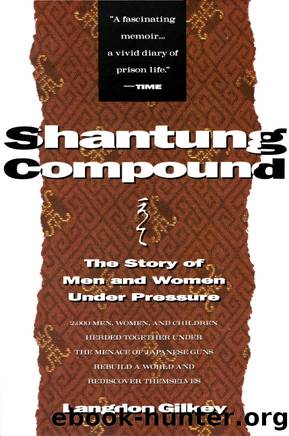Shantung Compound by Langdon Gilkey

Author:Langdon Gilkey [Gilkey, Langdon]
Language: eng
Format: epub
Publisher: HarperCollins
Published: 2012-11-09T08:00:00+00:00
Those of us who were on committees at the beginning had been appointed to our posts rather than elected. Although I was a convinced believer in democracy, the fact that I was appointed had hardly bothered me. Nor did it at first occur to me that a more democratic way of choosing our camp government might be preferable. I liked my job; I was delighted to be a âbig shot.â The thought of a possible election probably signaled more of a threat than a promise to the average committeeman.
I soon noticed, however, that my own attitude was changing, as was that of the other men in similar work. The remarks people made to us when we sought to deal with them did the most to effect this change. When we tried to move anyone, or change anybodyâs status for the worse, we were met by suspicious questions about ourselves:
âWhere do you get the authority to come in here and tell me to move?â someone would say. âWhy arenât you moving, too, if itâs so all-fired important that we move? And why arenât your friends being moved? Incidentally, I notice those other committeemen arenât moving either!â
Such a fog of suspicion could never be dispelled so long as we held office by appointment. Then the question âHow did you get your authority?â was not answerable. Our authority derived merely from the other committeemen and not from the persons with whom we had to deal; in the most concrete sense, it was an illegitimate authority.
One reason that democracy is essential as a form of government suddenly dawned on me: under it, authority is derived from the very people who suffer from its exercise, and a rational answer can be given to the question of its legitimacy. If I had been elected, I could have said, âHow did I get this authority? From you! And if you do not feel we are doing an honest job, pick someone else at the next election.â
Amusingly, therefore, the very men who at first basked in the security of having been appointed found they preferred the risk of elected status. This was not because of âfaith in democracy,â though most of us had that, but because of the need to compel the carping public to share in part with us some of the onus for the unpopular actions we must take. As the supplies man remarked: âThen the people who always complain will have helped to put me here in this post. I can more easily overlook their carping at what they call my inefficiency and dishonesty!âbecause they have elected me, and so itâs their fault as much as mine!â
For these reasons, after six months in camp, it became a regular practice, twice a year, to elect the nine chairmen of the committees. Gradually, the same process of âdemocratizationâ took place in all those positions of responsibility where conflicts could occur, where complaints were common and suspicions likely.
Being the manager of a kitchen was, for example, a post of real responsibility.
Download
This site does not store any files on its server. We only index and link to content provided by other sites. Please contact the content providers to delete copyright contents if any and email us, we'll remove relevant links or contents immediately.
Harry Potter and the Goblet Of Fire by J.K. Rowling(3041)
Unfinished: A Memoir by Priyanka Chopra Jonas(2916)
Never by Ken Follett(2880)
The Man Who Died Twice by Richard Osman(2297)
Machine Learning at Scale with H2O by Gregory Keys | David Whiting(2289)
Fairy Tale by Stephen King(2069)
Will by Will Smith(2041)
Rationality by Steven Pinker(1764)
The Storyteller by Dave Grohl(1660)
The Dawn of Everything: A New History of Humanity by David Graeber & David Wengrow(1570)
The Dark Hours by Michael Connelly(1569)
The Stranger in the Lifeboat by Mitch Albom(1532)
Cloud Cuckoo Land by Anthony Doerr(1434)
The Becoming by Nora Roberts(1330)
Friends, Lovers, and the Big Terrible Thing by Matthew Perry(1327)
New Morning Mercies: A Daily Gospel Devotional by Paul David Tripp(1321)
Einstein: His Life and Universe by Walter Isaacson(1315)
Crying in H Mart by Michelle Zauner(1315)
A Short History of War by Jeremy Black(1300)
